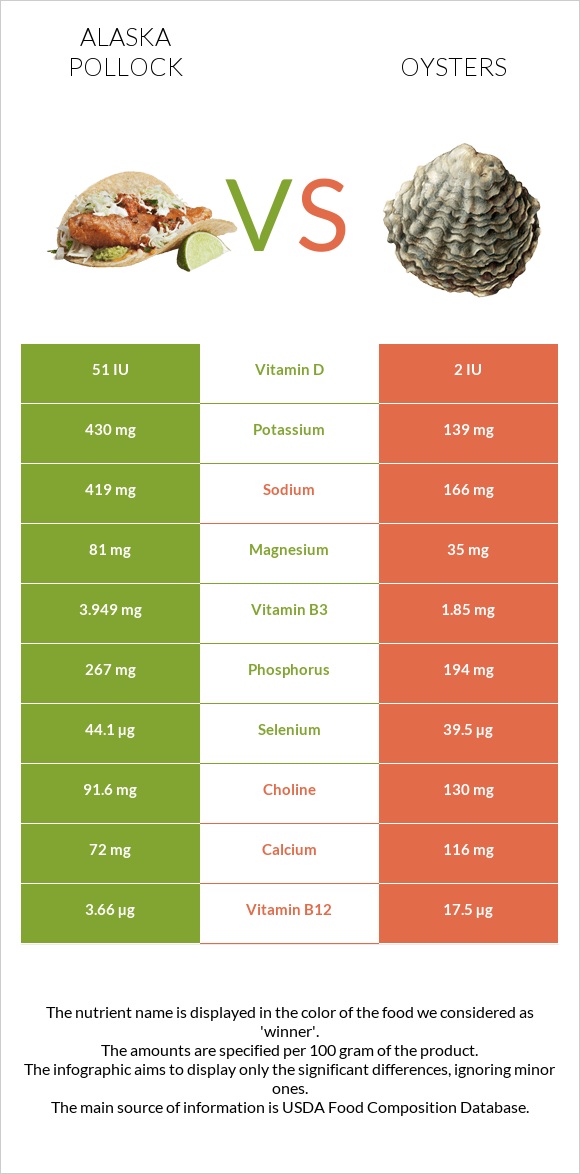Pollock vs. Oysters — In-Depth Nutrition Comparison
Compare
What are the main differences between pollock and oysters?
- Pollock is richer in vitamin B6, vitamin B3, magnesium, and phosphorus, while oysters is higher in zinc, copper, vitamin B12, iron, and manganese.
- Oysters's daily need coverage for zinc is 709% higher.
- Oysters has 5 times less vitamin B6 than pollock. Pollock has 0.329mg of vitamin B6, while oysters has 0.061mg.
- Oysters is lower in sodium.
We used Fish, pollock, Alaska, cooked, dry heat (may have been previously frozen) and Mollusks, oyster, eastern, wild, cooked, moist heat types in this comparison.
Infographic

Infographic link
Mineral Comparison
Mineral comparison score is based on the number of minerals by which one or the other food is richer. The "coverage" charts below show how much of the daily needs can be covered by 300 grams of the food.
| Contains more MagnesiumMagnesium | +131.4% |
| Contains more PotassiumPotassium | +209.4% |
| Contains more PhosphorusPhosphorus | +37.6% |
| Contains more SeleniumSelenium | +11.6% |
| Contains more CalciumCalcium | +61.1% |
| Contains more IronIron | +1544.6% |
| Contains more CopperCopper | +9411.7% |
| Contains more ZincZinc | +13689.5% |
| Contains less SodiumSodium | -60.4% |
| Contains more ManganeseManganese | +3183.3% |
Vitamin Comparison
Vitamin comparison score is based on the number of vitamins by which one or the other food is richer. The "coverage" charts below show how much of the daily needs can be covered by 300 grams of the food.
| Contains more Vitamin DVitamin D | +∞% |
| Contains more Vitamin B1Vitamin B1 | +50% |
| Contains more Vitamin B2Vitamin B2 | +23.9% |
| Contains more Vitamin B3Vitamin B3 | +113.5% |
| Contains more Vitamin B6Vitamin B6 | +439.3% |
| Contains more Vitamin AVitamin A | +52.9% |
| Contains more Vitamin EVitamin E | +507.1% |
| Contains more Vitamin B12Vitamin B12 | +378.1% |
| Contains more Vitamin KVitamin K | +1900% |
| Contains more FolateFolate | +366.7% |
All nutrients comparison - raw data values
| Nutrient |  |
 |
DV% diff. |
| Zinc | 0.57mg | 78.6mg | 709% |
| Copper | 0.06mg | 5.707mg | 627% |
| Vitamin B12 | 3.66µg | 17.5µg | 577% |
| Iron | 0.56mg | 9.21mg | 108% |
| Manganese | 0.018mg | 0.591mg | 25% |
| Protein | 23.48g | 11.42g | 24% |
| Vitamin B6 | 0.329mg | 0.061mg | 21% |
| Vitamin B3 | 3.949mg | 1.85mg | 13% |
| Magnesium | 81mg | 35mg | 11% |
| Sodium | 419mg | 166mg | 11% |
| Phosphorus | 267mg | 194mg | 10% |
| Potassium | 430mg | 139mg | 9% |
| Vitamin E | 0.28mg | 1.7mg | 9% |
| Selenium | 44.1µg | 39.5µg | 8% |
| Vitamin D | 1.3µg | 0µg | 7% |
| Choline | 91.6mg | 130mg | 7% |
| Vitamin D | 51 IU | 2 IU | 6% |
| Calcium | 72mg | 116mg | 4% |
| Saturated fat | 0.159g | 0.948g | 4% |
| Fats | 1.18g | 3.42g | 3% |
| Vitamin B2 | 0.223mg | 0.18mg | 3% |
| Folate | 3µg | 14µg | 3% |
| Polyunsaturated fat | 0.583g | 1.056g | 3% |
| Carbs | 0g | 5.45g | 2% |
| Cholesterol | 86mg | 79mg | 2% |
| Vitamin B1 | 0.054mg | 0.036mg | 2% |
| Vitamin K | 0.1µg | 2µg | 2% |
| Vitamin A | 17µg | 26µg | 1% |
| Monounsaturated fat | 0.134g | 0.506g | 1% |
| Calories | 111kcal | 102kcal | 0% |
| Net carbs | 0g | 5.45g | N/A |
| Sugar | 0g | 1.23g | N/A |
| Starch | 0.9g | 0% | |
| Vitamin B5 | 0.432mg | 0.447mg | 0% |
| Trans fat | 0.068g | N/A | |
| Tryptophan | 0.263mg | 0.138mg | 0% |
| Threonine | 1.029mg | 0.046mg | 0% |
| Isoleucine | 1.082mg | 0.459mg | 0% |
| Leucine | 1.908mg | 0.716mg | 0% |
| Lysine | 2.157mg | 0.762mg | 0% |
| Methionine | 0.696mg | 0.257mg | 0% |
| Phenylalanine | 0.917mg | 0.413mg | 0% |
| Valine | 1.21mg | 0.523mg | 0% |
| Histidine | 0.691mg | 0.22mg | 0% |
| Omega-3 - EPA | 0.086g | 0.353g | N/A |
| Omega-3 - DHA | 0.423g | 0.271g | N/A |
| Omega-3 - ALA | 0.163g | N/A | |
| Omega-3 - DPA | 0.027g | 0.02g | N/A |
| Omega-3 - Eicosatrienoic acid | 0.004g | N/A | |
| Omega-6 - Gamma-linoleic acid | 0.004g | N/A | |
| Omega-6 - Dihomo-gamma-linoleic acid | 0.007g | N/A | |
| Omega-6 - Eicosadienoic acid | 0.007g | N/A | |
| Omega-6 - Linoleic acid | 0.061g | N/A |
Macronutrient Comparison
Macronutrient breakdown side-by-side comparison
| Contains more ProteinProtein | +105.6% |
| Contains more OtherOther | +11.2% |
| Contains more FatsFats | +189.8% |
| Contains more CarbsCarbs | +∞% |
~equal in
Water
~78.19g
Fat Type Comparison
Fat type breakdown side-by-side comparison
| Contains less Sat. FatSaturated fat | -83.2% |
| Contains more Mono. FatMonounsaturated fat | +277.6% |
| Contains more Poly. FatPolyunsaturated fat | +81.1% |



